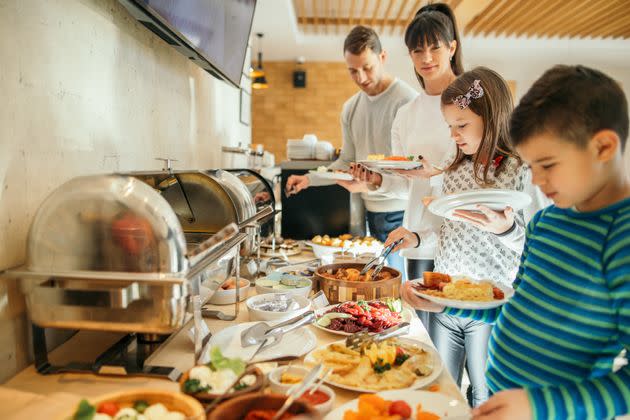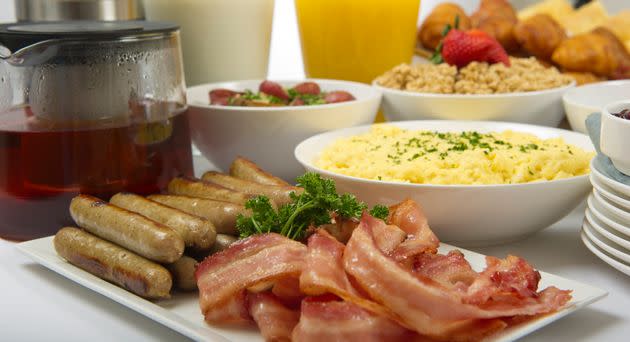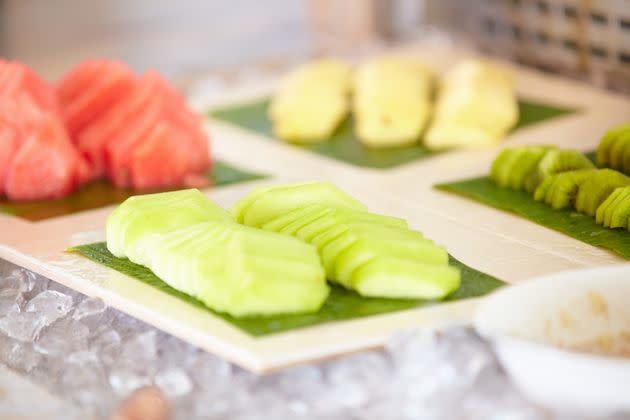Want To Avoid Food Poisoning? Skip These Items At Your Hotel's Breakfast Buffet

Most food lovers agree that when you’re on vacation, one of the perks of staying at a hotel is the free continental breakfast or breakfast buffet included with your visit.
On the other hand, one of the biggest setbacks you can have on a vacation is being relegated to the bathroom after you’ve contracted a foodborne illness. And food that’s been sitting out all morning can be at high risk of potential bacteria contamination, so it’s important to know which items are safe to eat — and which you may want to skip.
“There are two main factors I think about … that can increase [the] risk of getting foodborne illness,” explained Dr. Ellen Shumaker, director of outreach for the Safe Plates program at North Carolina State University. “[Those are] temperature control of foods [and] … other guests potentially contaminating utensils or food due to lack of handwashing.”
A lot of the time you can’t taste the difference when food is contaminated, so it’s key to know what to look out for ahead of time.
“There’s a number of different microorganisms [that can contaminate food and] can prove to be pathogenic or produce toxins,” said Dr. Bryan Quoc Le, food scientist and food science consultant. “For example, [with] certain species of E. coli, salmonella or listeria, you only need a couple cells to really cause havoc.”
We talked to food safety experts about what they usually avoid at a hotel breakfast — and what they feel comfortable eating and drinking.
Avoid: Hot foods (like meat or egg products) that aren’t kept at a heated temperature.
“Hot foods [should be] staying hot, and cold foods [should be] staying cold,” Shumaker said. “[This helps to] avoid … the temperature danger zone where bacteria like to grow.”
When foods are left out in the “danger zone” (between 40 and 140 degrees Fahrenheit) for more than two hours, germs that make you sick can rapidly reproduce, according to the Centers for Disease Control and Prevention (CDC). And in a buffet or continental breakfast setting, food is likely sitting out longer than that.
If you see sausage patties, bacon, scrambled eggs, quiches or other meat and egg products sitting out without any heating appliance, you’re going to want to skip those. These types of foods should be kept warm with a device such as a hot plate or chafing dish, Shumaker explained.
“This does not give the exact temperature, of course, but is an indicator that measures are being taken to keep food in a safe temperature range,” she said.

Avoid: Cold foods (like dairy products and fresh juices) that aren’t kept at cold temperatures.
“If there’s milk that’s been sitting around and it’s not on ice or hasn’t been refrigerated, that’s certainly something that I’m planning on avoiding,” Le said.
You’re going to want to make sure perishable items (like yogurt, cheeses and deli meats) are kept cold and stay out of the temperature “danger zone.” Some precut fruits and veggies (like tomatoes, leafy greens and melon) also should be chilled because “when cut, the fleshy part … has the level of moisture and pH to allow bacteria that can cause illness to grow,” according to Shumaker.
As for juices, both fresh and pasteurized should be cold. Since fresh juice isn’t pasteurized, it’s at a higher risk for growing harmful bacteria when left out at room temperature. Shelf-stable juice packaged in boxes, bottles or cans don’t need to be refrigerated, according to the U.S. Food and Drug Administration (FDA).
Individually wrapped creamers and butter packets also don’t need to be kept cold. These types of creamers have been treated to kill off bacteria, and the salt in the butter helps it maintain shelf stability, Shumaker explained.
Avoid: Fruits and veggies that are soggy or tough to clean.
While Le generally eats from the salad bar if it looks clean and fresh, he pays attention to signs that the fruits and veggies aren’t being properly handled. For example, if they have soft edges or if there’s any dirt or other material on the surfaces, this could indicate that they’re old or haven’t been thoroughly washed.
Melons, like cantaloupes, can be particularly risky because people often don’t wash the rinds, he said. If the rind is damaged and there’s bacteria on it, it can spread to the inside part of the melon. It can also cross-contaminate other fruits or veggies it touches.
“Fresh vegetables that are normally picked from the ground, like a lettuce or a cabbage … can pick up dirt quite a bit and then spread that … if they haven’t been washed carefully,” Le added. “Dirt can … start to produce a number of different microorganisms.”
Raw sprouts (such as alfalfa or mung bean) should be avoided, Shumaker explained. They’re grown from seeds and beans under warm, humid conditions, which are ideal for the growth of E. coli, salmonella and listeria, according to the FDA. “If just a few harmful bacteria are present in or on the seed, the bacteria can grow to high levels during sprouting.”

Avoid: Anything from a shared bowl that doesn’t have a serving utensil.
Sure, that tray of fruit may look appetizing — until you notice there’s no serving utensil for it and people are touching it with their bare hands. If they haven’t washed their hands after using the restroom, coughing or blowing their nose, they could be contaminating the other food on the plate, Shumaker said.
When you do use serving utensils or shared condiments that a lot of other people are touching, you want to make sure your hands are clean before picking up the food on your plate.
“Other guests may have hands that have not been washed thoroughly after using the restroom or … have been in their mouths for their finger-licking first course,” said Dr. Jonathan Deutsch, professor of culinary arts and science at Drexel University. “I always try to sanitize my hands between making my plate and sitting down to eat.”
Norovirus, known as the “stomach bug,” is the most likely culprit to be transferred from unclean hands to utensils and surfaces.
“If not cleaned and sanitized, norovirus can persist on surfaces for weeks,” Shumaker said.
What foods and drinks are safest to eat in a hotel breakfast setting?
Making sure food and beverages are served at the appropriate temperature and washing your hands before eating are two of the most important guidelines. There are a few other items experts say are safest to consume.
“I’m going to trust [packaged foods, like muffins or individual yogurts] more just because there’s a lot of processes that are involved to make sure that [they] are kept safe,” Le said. “[And] no one’s touching them or handling them.”
Deutsch said whole fruits that haven’t been cut (like bananas or oranges), cooked-to-order options like omelets, and cereal in a dispenser (wash your hands after touching the handle) are also usually safe bets, particularly if you’re immunocompromised.
For people who are at a higher risk of food poisoning (weakened immune system, pregnant, aged 65 and older, or younger than 5), they should especially be aware of options that are safer to eat and what to avoid. While anyone can get food poisoning, individuals in these groups could get severely sick from it, according to the CDC.
Do your research — and follow your gut.
Besides the above safety guidelines, you can also check out inspection reports for restaurants and hotels. (They are usually publicly available in the United States and many other countries, according to Deutsch.)
And when you’re eating out at a restaurant or hotel, “don’t be afraid to ask questions regarding how food has been handled,” Deutsch said. “And follow your gut — if you see something that’s questionable or if you have a health condition that makes you particularly vulnerable, pack some protein bars.”
